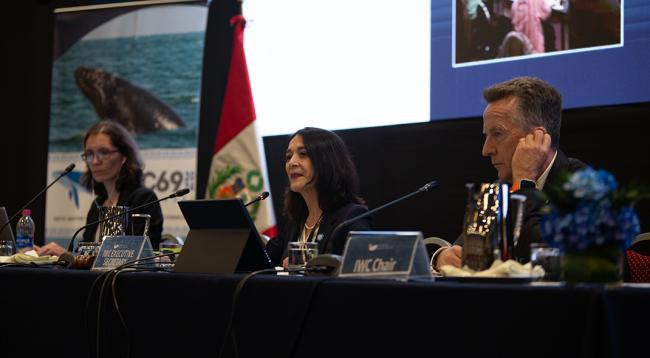“Our people are so few in number. This takes away the stress, where we can provide for our people, where the whale is the center of our culture.” Crawford Patkotak, Vice Chairman of the Alaska Eskimo Whaling Commission, spoke in response to the approval, by consensus, of extending for another six years strike limits (quotas) for Aboriginal Subsistence Whaling (ASW). Comments by all four aboriginal groups who practice ASW brought a positive end to the first day of the 69th meeting of the International Whaling Commission.
While whales have roamed the Ocean for more than 35 million years and been prey for humans for the last five or so millennia, it is only over the last two centuries that faster ships and more effective killing techniques started to cause precipitous declines in whale numbers. Some IWC members advocate for the continued moratorium on whaling that the IWC established in 1986, pointing to low numbers for some species, other anthropogenic threats, and research showing the key role that whales play in marine ecosystems and carbon sequestration. Other IWC members favor resumption of commercial harvests, emphasizing the sustainable use of a traditional food resource as a right, not a privilege.
These traditional divides surfaced early on the first day. During one of the first agenda items, the IWC’s new Executive Director Martha Rojas Urrego was asked to address questions about challenges some countries experienced in obtaining visas, including the IWC-69 Chair from Guinea, whose absence was temporarily filled by Vice Chair Nick Gales (Australia). Some said this created a “lack of balance” in the room and “trust issues” with the Commission, with the Secretariat explaining the efforts made to assist countries in attending the meeting.
Different perspectives also arose during comments on proposed changes to procedural rules on quorum and voting rights. Discussions on quorum focused on requirements to start a meeting, and on requirements for decision making, an issue that surfaced during the previous IWC meeting, where some countries broke quorum by leaving the plenary before a scheduled vote. Failing to reach consensus on any of the proposed options, the rules remained the same, with one breakthrough—quorum for decision making at this meeting, as ruled by Acting Chair Gales, will be determined by the number of credentialed countries present at the start of a session that is bounded by breaks.
IWC members heard presentations on the Secretariat’s work over the last biennium, agreeing to make the Secretariat’s report a standing agenda item. Scientific Committee (SC) Chair Alex Zerbini (Brazil) and SC Vice-Chair Lindsay Porter (UK) presented on population assessments; strike limit algorithms for AWS; bycatch and stranding initiatives; and climate change impacts. The presentation also highlighted efforts to improve communication about the SC’s work, including by providing information on the status of whale populations, and a “Scientific Hub” outside the meeting room, staffed by SC members.
Conservation Committee Chair Jack Collier (UK) reported on: efforts to align the new Strategic Plan for 2027-2036 with other relevant conventions; a decadal review of the Southern Ocean Sanctuary; recommendations on the bycatch initiative; support for Conservation Management Plans for priority populations; and the Extinction Alert mechanism. Both the Scientific Committee and Conservation Committee emphasized the need for additional funding to support their work.
On ASW, a presentation by ASW Chair Bruno Mainini (Switzerland) focused on: the recent eastern North Pacific gray whale Unusual Mortality Event (UME); lack of harm caused by current strike/catch limits; compliance with the approved timeline; a recommendation for extension of the catch/strike limits; and future consideration regarding use of the term ‘Aboriginal.’
The first day closed with Acting Chair Gales saying that consensus on the ASW limits shows that the IWC is “good for our word,” showing the Commission’s ability to make progress, in a respectful way.
To receive free coverage of global environmental events delivered to your inbox, subscribe to the ENB Update newsletter.
All ENB photos are free to use with attribution. For this event, please use: Photo by IISD/ENB - Angeles Estrada Vigil





































